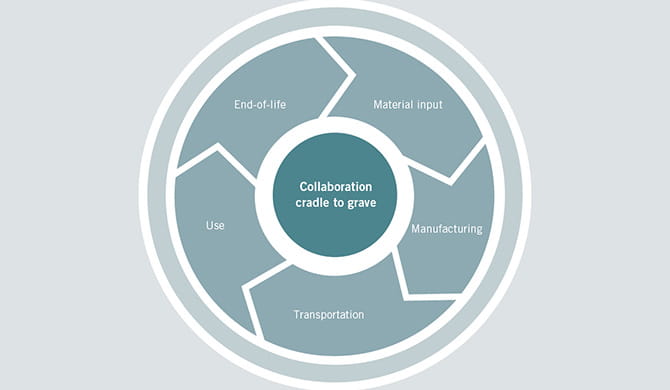Innovation and collaboration for reduced environmental impact
In order to meet current and future environmental and social challenges, innovative solutions and collaboration throughout the entire value chain are required. Evercare Medical has worked for several years to develop a product range that reduces negative environmental and social impact.
To mitigate the climate impact, Evercare Medical collaborates with partners to explore new innovative solutions, sustainable manufacturing methods, and alternative raw materials.
“We strive to find raw materials and innovative production processes that help us reduce our environmental impact. All our products comply with our code of conduct and quality requirements throughout the entire value chain. Embra takes a step further in terms of environmental impact. It is our way of taking care of patients, caregivers, and the future”, says Olof Bachman, Business Manager Gloves & Protection Evercare Medical

1. Materials
By evaluating various materials, we can reduce resource utilization and increase the renewable or recycled materials. For instance, the Embra Apron Bosco Green contains at least 70% sugarcane ethanol, while Embra surgical caps consist of 80% viscose. Prior to launch, products undergo testing by healthcare professionals to ascertain the optimal balance between functionality, comfort, and materials. We currently have products with first generation biomaterials that contributes to reduced emissions, and we are actively researching second and third generation biomaterials and circular materials to ensure we also address other impact factors than just carbon emissions (e.g. land use, freshwater ecotoxicity, biodiversity etc.), and also to lower our emissions further.
2. Manufacturing
Manufacturing single-use items can in some cases involve high-energy consumption. One of the rationales for testing and utilizing new materials lies in their potential to reduce energy consumption. For example, the examination glove Embra Proceed is crafted from a novel nitrile-based material requiring less energy in production, resulting in 27% lower CO2e emissions compared to our standard nitrile glove, SELEFA Sense Blue*. Another example is the Embra Nonwoven Swabs which eliminates several steps in the production process compared to cotton gauze. One of the impact factors reduced is the water used for production along with reduced carbon emissions.
3. Transportation
Evercare Medical recognize that transportation does not significantly contributes to the climate footprint in any of the LCA’s we have performed, but just as any other areas it is an opportunity to improve and area we monitor for improved solutions.
4. Product Usage and Disposal
Collaborating with partners, Evercare Medical is exploring innovative solutions in recycling and waste management processes, striving to replace single-use items with reusable alternatives where appropriate. There is a pressing need to foster a more circular economy in healthcare. At the same time there is a need to carefully consider the infrastructure for any such circular project. Without the right infrastructure and validation of reduced environmental impact, such project might not have the intended outcome.
Olof Bachman
Business Manager
Gloves & Protection,
Evercare Medical








